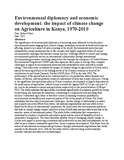| dc.description.abstract | The significance of environmental diplomacy is becoming more elaborate by the day since environmental issues ranging from climate change, hazardous chemicals to biodiversity loss are affecting almost every aspect of policy making in the world. Environmental protection and sustainability remain paramount due to the complex and highly important reality of current environmental challenges that threaten human survival. Although efforts to counter and manage environmental problems anchor on international collaboration through international environmental governance involving many actors for example the emergence of United Nations Environmental Programme (UNEP) and other agencies, there seem to emerge other complex challenges in regard to environmental protection and sustainability most noticeably climate change.
This study seeks to address the impact of climate change on agriculture in Kenya with a special focus on agriculture as the leading sector in the Kenyan economy in terms of its contribution to real Gross Domestic Product (GDP) from 1970 to the year 2010. The performance of the agricultural sector is determined by crop production which depends on a number of factors; most importantly country's endowment of soils and climate resources. Owing to the significant role agriculture plays in Kenya, economic development is largely dependent on the performance of agriculture. Indeed Kenya recorded the highest GDP of 7.8 per cent and 5.8 per cent in the national economy and agriculture respectively in the period between 1970 and 1974.
The study indicates that agriculture contributes significantly to economic growth in Kenya by providing raw materials for industries, contributing to employment and providing food security. Sustainable agriculture is therefore critical in ensuring economic profitability, environmental stewardship and improved quality of life of the people of Kenya. The study establishes that like other environmental challenges, climate change is trasboundary in nature and requires concerted efforts from states, international organizations and non-states actors. Based on the theory of international cooperation, the study notes that environmental problems that lead to climate change require collective action of both state and non-state actors due to the anarchic nature of international system.
The study further establishes that cooperation is motivated by a balance of absolute and relative gains and the extent of durability of such a cooperative arrangement. The study identifies possible ways of managing climate change in Kenya with regard to preserving ecosystems and biodiversity on one hand and adaptation on the other so as to enhance sustainable agriculture, hence economic development. This stems from the notion of international environmental governance through international negotiations that would cascade to the domestic level. Data for the study will be collected using content analysis, scientific analysis and interview methodologies. | en_US |

